
Airport scams and how to avoid them
Airports are full of excited people who are busy thinking about the beautiful destination that awaits them, which can unfortunately make airports a common target for scammers.
Throw in jetlag, language barriers and families travelling with children and you’ve got a scammer’s paradise full of unsuspecting victims. But don’t worry! We’ve compiled a list of the most common airport scams and how you can steer clear of them. With a bit of preparation and travel smarts, you can breeze through airports without a worry.
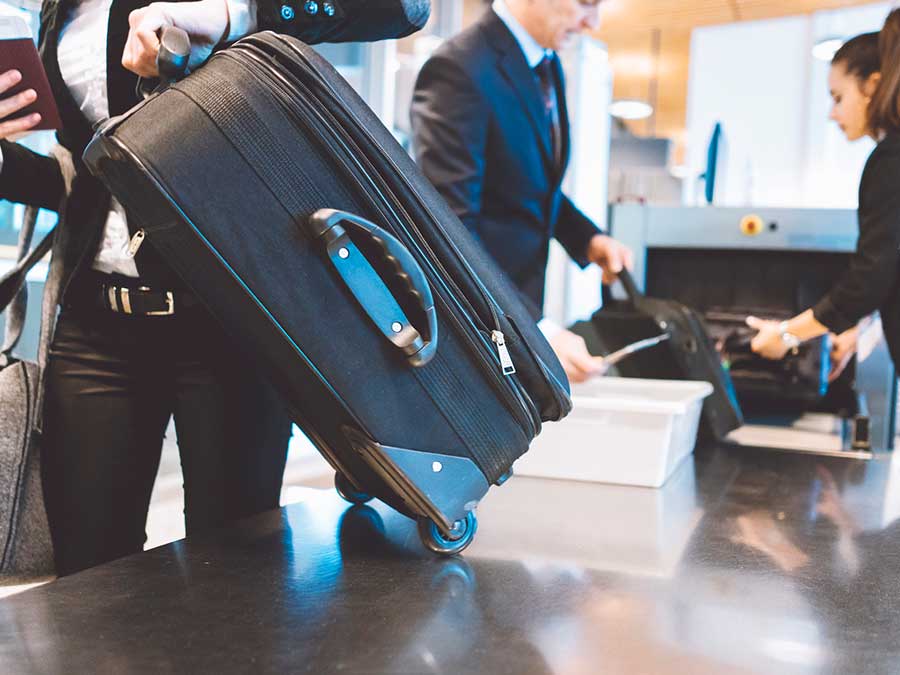
1. The security staller
How it works
You’re finally at the front of the security screening queue, hurrah! You place your laptop and bags on the conveyor belt to go through the x-ray, while you head through the passenger scanner. The person in front of you goes through but the buzzer sounds, so he removes his belt and tries again. This time, it’s his watch, then it’s his keychain… There’s always one!
Once you get through the scanner, your stuff is gone. You’ve been scammed by the security staller. While he kept you waiting, his accomplice in front of him swiped your stuff, quickly hid it in his own bag and left before you even knew it was gone.
How to avoid it
There are a few tips on how to avoid the security staller:
- Keep an eye on your laptop at all times, even if you think it’s safe. If you can’t see it, or you can see someone reaching for it, tell the security guards immediately. Also, try not to place it on the conveyor belt until you know you can walk through the scanner yourself.
- It’s always a good idea to make your items bright and obvious. While you might not want to cover your laptop in stickers, perhaps try putting a bright strap around it to help you keep track of it, even if it’s in someone else’s hands.
- If you’re travelling with a companion, try splitting up so that your friend can go through, then you place items on the conveyor belt once they’ve cleared the passenger scanner. That way, they’re already waiting for your gear once it comes through the x-ray.
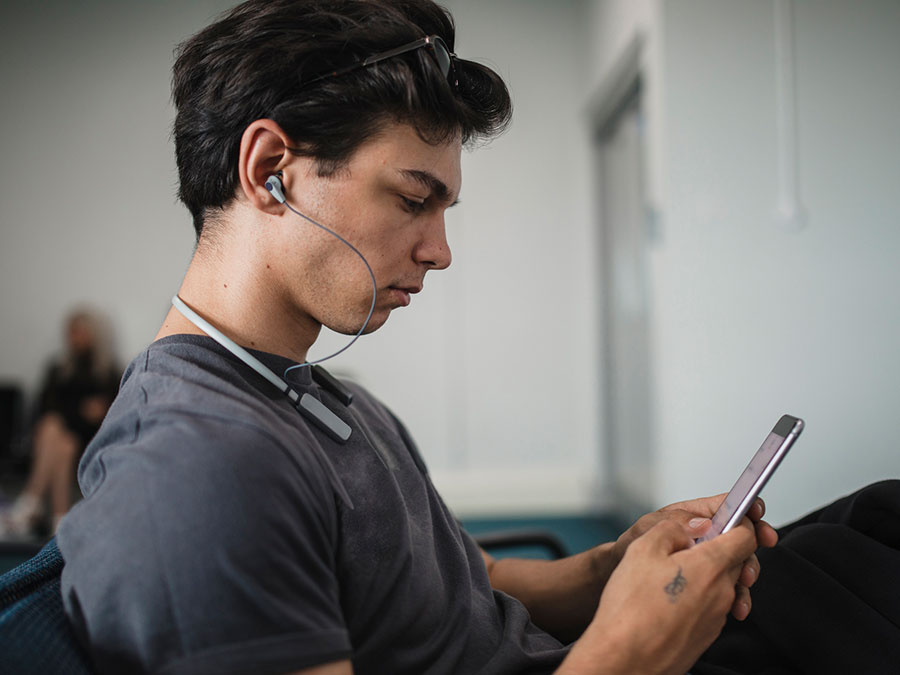
2. Bluetooth blunder
How it works
You’re keeping yourself amused listening to music in your Bluetooth headphones. What you don’t realise is that the Bluetooth connectivity that links your phone to your headphones also lets any of the people around you access your phone and information. That means reading your emails and texts, scrolling through your photos and getting access to any personal information you might have stored on your phone. Yikes!
How to avoid it
Here are a few ideas to give Bluetooth snoopers the slip:
Bluetooth connectivity is great, but if you can get away without having it on, then leave it off – even if that means avoiding wireless headphones.
As a default, ensure your phone is set to ‘undiscoverable’ in the Bluetooth settings, so that if you do need to use it, your phone is secure.
You can also purchase phone encryption software if you’re storing sensitive data, for added security and protection.
Finally, try to store your important information somewhere it can’t be easily found, like a flash drive or an encrypted document.
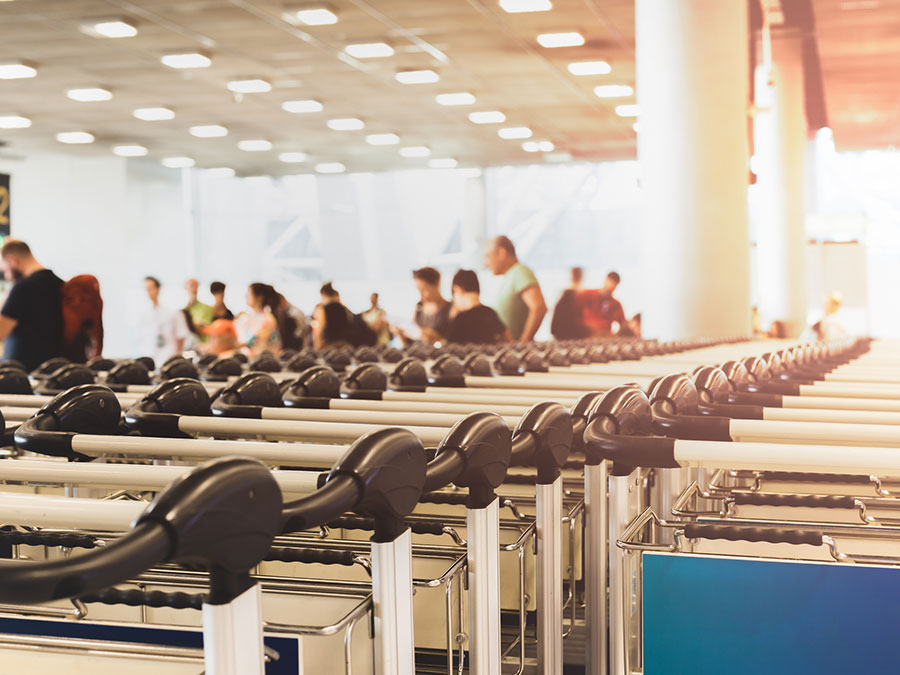
3. Horrible helpers
How it works
You’ve reached your destination, claimed your bags and passed customs inspection. As you walk through the arrivals hall, some helpful person approaches and offers to carry your heavy bags, or push your trolley for you. Watch out! While they may seem helpful and courteous, these scam artists will demand a cash payment for assisting you and have even been known to hold unwitting passengers’ luggage to ransom until their fee is paid.
How to avoid it
There are a few ways to avoid over-zealous helpers:
The golden rule here is to carry your own baggage and never let it fall into the hands of people you don’t know (except for baggage handlers and check in staff!).
Some airports have a short supply of luggage trolleys, or charge for the use of them. Keep in mind when you’re packing that you may need to carry your bags, so pack light. It’s also important never to let your luggage out of sight, even if you’re waiting at the luggage carousel. Place collected luggage in front of you and if you see your bag on the carousel, keep an eye on it as it comes around. It can be helpful to attach a bright strap or ribbon to your bag to make it extra-recognisable, too. Some of these ‘helpers’ have even been known to take bags right off the carousel!
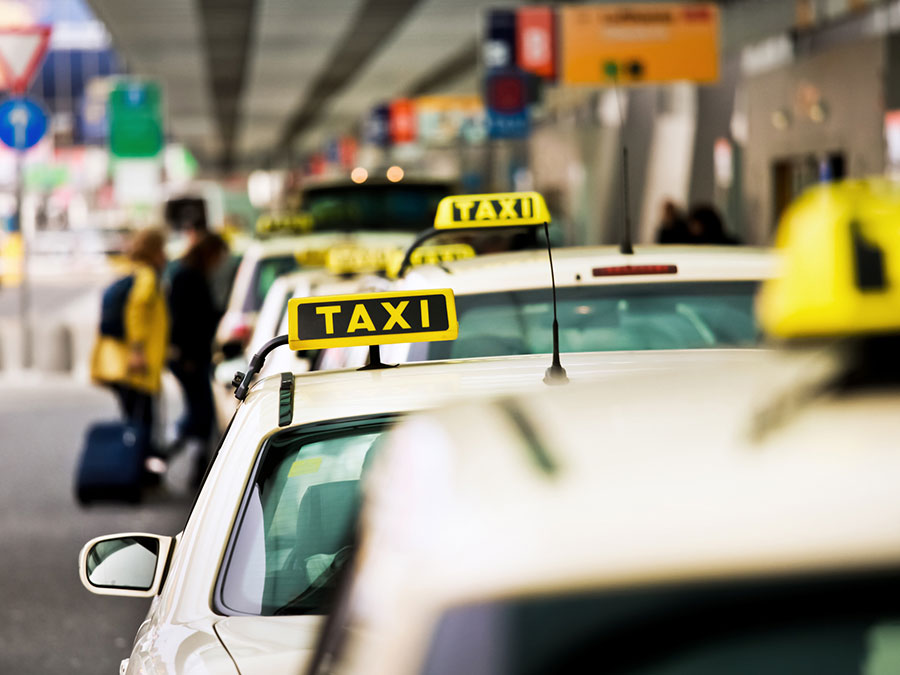
4. Taxi tricks
How it works
You’re tired after a long flight and eager to get to your accommodation. You hadn’t organised a pickup with your hotel, but upon exiting the arrivals gate, you see a friendly person in uniform with your name on a board. Your hotel must have organised a pickup for you, great! But beware…halfway to your accommodation they pull over and demand a hefty ransom fee to take you the rest of the way.
It’s late at night and you’re in an unfamiliar city, so there seems to be little choice but to comply. You’ve fallen victim to a plot hatched in conjunction with crooked airline staff, who supply these ‘drivers’ with passenger names and accommodation details taken from customs arrival cards.
How to avoid it
We know long haul journeys can be downright exhausting, but you need to keep your wits about you to avoid a dangerous situation like this one. Here’s how:
Before you depart, ensure you have printed copies of all your accommodation details, including any transport arrangements. Confirm with your hotel whether they have made transport arrangements for you and get this in written form to keep with your printouts.
Finally, if you do see your name on a board and you’re not expecting a pickup, ignore it completely. Instead, stick to official airport taxi ranks or ask at an information centre for a recommended taxi company. It’s far better to miss out on a potential free ride than to find yourself in an expensive sticky situation!
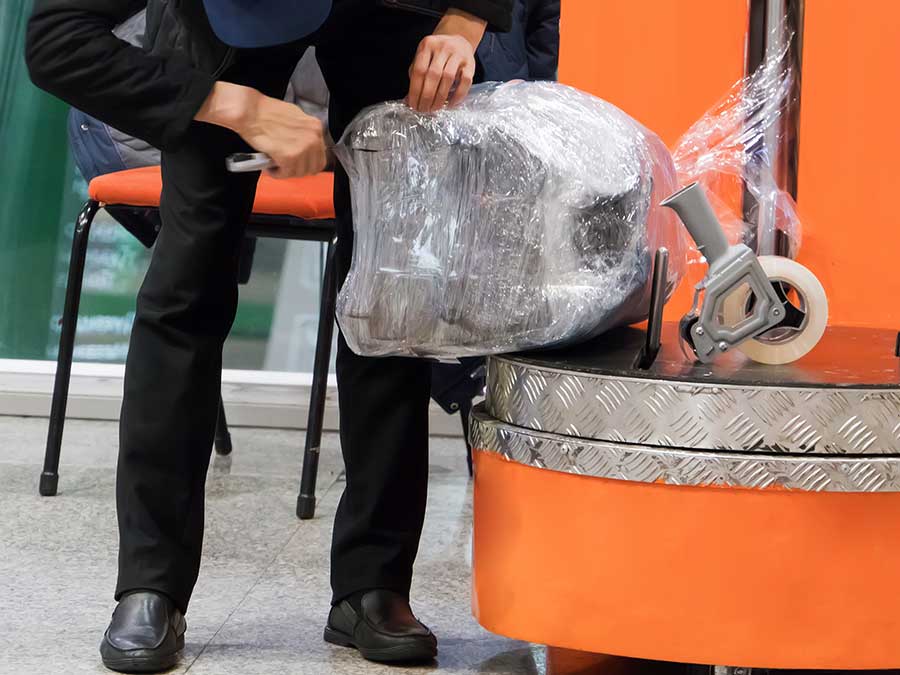
5. Loaded luggage
How it works
You’re leaving the Philippines after a tropical getaway, when your baggage sets off the security x-ray. How strange! Next thing you know; you’re taken to a room for questioning. Officials accuse you of having a bullet in your bag, which was secretly planted by airport staff when you weren’t looking.
Of course, carrying weapons of any kind is strictly forbidden and you’re forced to pay an exorbitant fine to avoid detainment or even imprisonment! This scam has been reported multiple times from passengers departing Manila airport, starting in early 2015.
How to avoid it
It’s not easy when officials are in on the act, but there are some steps you can take to ensure your luggage is bulletproof:
If you’re purchasing a new suitcase before your trip, try one of the hard cover clam shell designs. Not only are they sturdy enough to help protect anything fragile, but their lack of external pockets means there’s nowhere to hide any sneaky bullets (or anything else for that matter).
If you’re using an existing suitcase that has external pockets, try using the luggage wrap available at kiosks around most international airports. This luggage wrap is basically like plastic food wrap, although it’s considerably stronger and more secure. It’ll eliminate any spaces in which to hide bullets or otherwise, plus it covers the zips and openings to keep your baggage secure.
Always lock your suitcase, including any external pockets. Using a combination lock means the keys can’t fall into the wrong hands. If you don’t use your external pockets at all, try securing them tightly with a plastic cable tie. It won’t stop people from being able to access the pockets, but it is a deterrent!
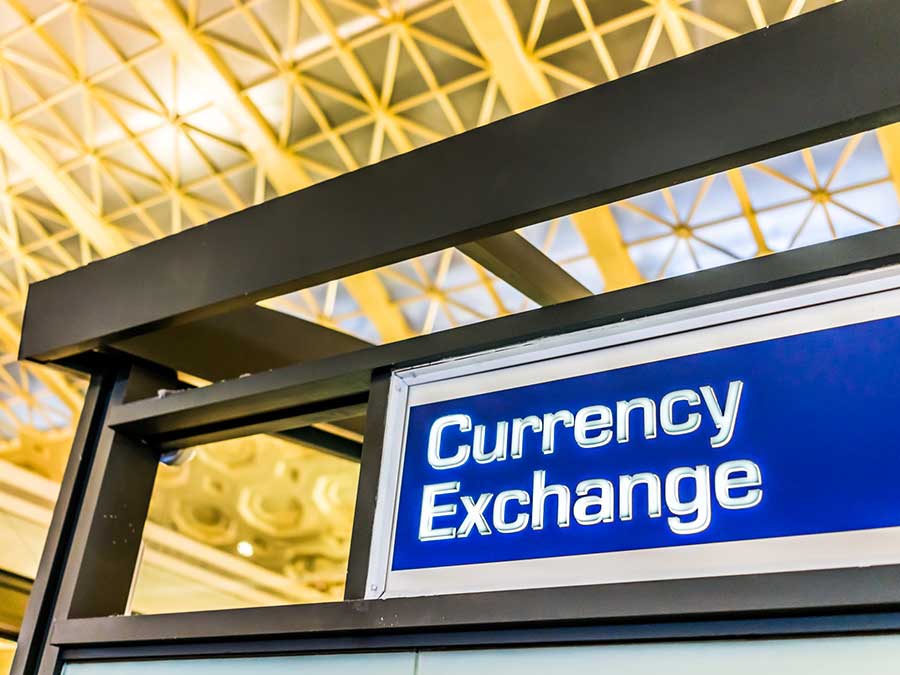
6. Corrupt currency
How it works
You’ve landed in a new place and realised you forgot to change some currency before you left! You head to the first currency converters you see, but when you get your new currency back, it’s not the amount it should be. You’ve been overcharged drastically on the exchange rate. The clerk says the advertised rate is the ‘daytime’ rate, but since it’s now evening there’s a more expensive after hours rate you must pay.
Another common scam here involves the clerk counting the money so slowly that you eventually lose patience and just accept what they give you, in a rush to make up for lost time. Once you’re out of the airport, you realise you’ve been short-changed considerably.
How to avoid it
When it comes to exchanging currency, the airport is the worst place to do it. Some airports don’t have vetting processes for their currency exchange agents and therefore you could be dealing with anybody. There are two ways to get around this common scam:
Change your currency through your bank before you depart. Shop around for the best exchange rates and, if possible, get your currency in advance so you’re ready.
If you’re at the airport and you don’t have any local currency, get out just enough to cover a taxi to your accommodation and a little bit extra just in case. The next day you can search for a reputable currency conversion agent, like Western Union, to get the remaining money you need.
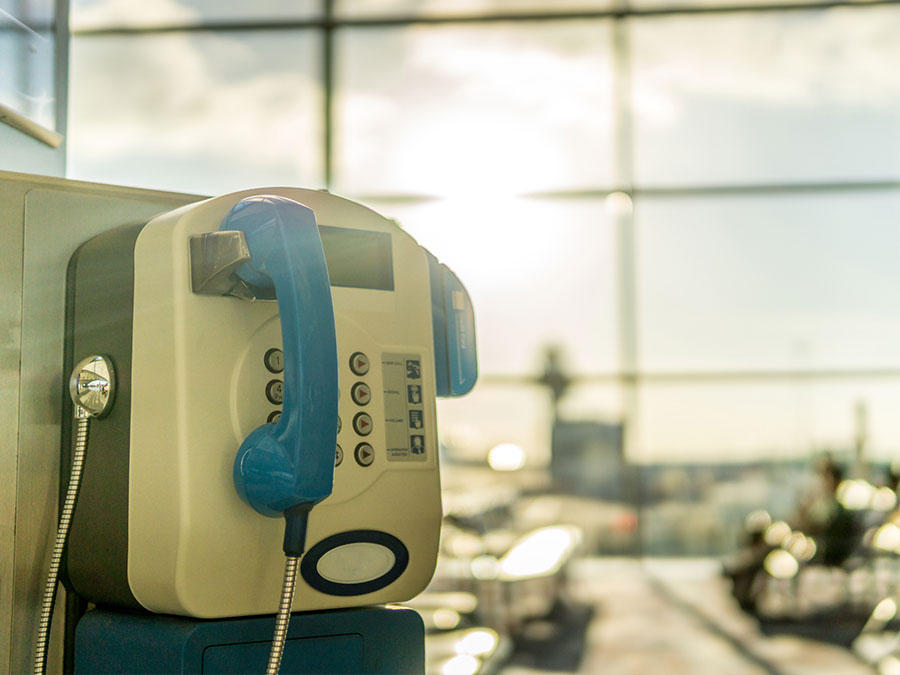
7. Payphone problems
How it works
You’re at the airport having landed at a new destination, when you suddenly remember you need to call your accommodation to arrange a pickup. Problem is, your phone’s flat and you haven’t changed over any currency yet. Thankfully you spot a payphone that accepts credit cards as payment. It doesn’t have any fees marked on it, but you need to make the call and this seems to be your best option. Wait a minute!
You’re about to be scammed by one of the oldest tricks in the book. Many of these phones are responsible for outrageous phone bills for minute-long phone calls, with operators claiming they charge a minimum of five minutes as soon as the call is connected.
How to avoid it
Here are some steps you can take to avoid a hefty bill:
Using any machine that accepts credit cards carries a risk, but when there’s no standard fee marked and nobody to be held accountable, you’re left entirely at the mercy of an unknown. If you really need to make a call, get some cash out first. It might cause a bit of delay, but it’ll save you plenty in the long run.
Alternatively, consider carrying a travel USB charger for your phone, so you can charge it anytime and won’t be caught out in an emergency.
If the call can be made later, just wait until you have access to a phone that won’t cost the earth – even if it means coughing up for a taxi to your hotel.
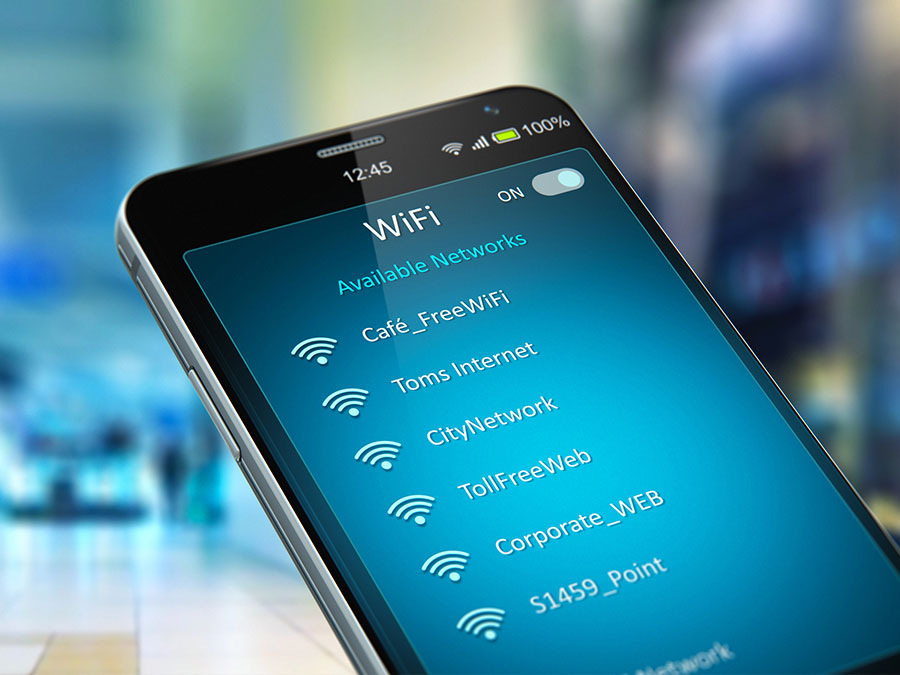
8. Wi-Fi worries
How it works
You’re stuck in yet another departure hall for another long wait. Good news though, when you scan the list of available Wi-Fi networks there are a couple that pop up titled ‘Free Wi-Fi.’ Perfect! You log on and start browsing your favourite websites to pass the time, relieved to be able to do something instead of just sitting there waiting.
Be careful though, as many of these ‘Free Wi-Fi’ networks are anything but and have been set up by hackers to create a link to your computer or phone, so they can access your private information. Not to mention gaining a record of any websites you visit – including online banking.
How to avoid it
Here are a few tech-tips to keep you safe:
Many airports do have free Wi-Fi available, but it pays to check before you log on – ask at an information desk whether there is Wi-Fi available and, if so, which network you should link to.
Always avoid any networks that are computer-to-computer instead of Wifi, as they’re likely to link straight to a hacker’s computer.
Even if you’re confident the network is safe, avoid logging in to things like online banking whenever possible.
Don’t forget, when it comes to travel most problems can be avoided by doing your research, being prepared and keeping your wits about you. Always get travel insurance too, so you’re covered if the unexpected happens.
The content of this article is general and provided for information purposes only. Southern Cross Travel Insurance (SCTI) doesn’t guarantee or warrant the accuracy, completeness or currency of any article.
This article may contain hyperlinks to other websites owned or operated by third parties, or references to third party products or services. SCTI isn’t responsible for, and makes no recommendation about, the content or accuracy of any third party website, or for the suitability or performance of any product or service. The inclusion of a link in this article doesn’t imply that SCTI endorses the website or third party product/service.





